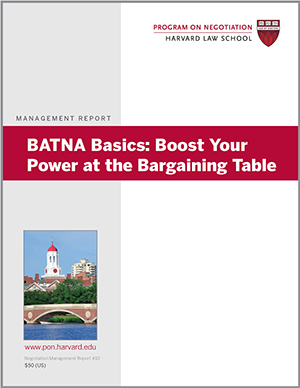
The BATNA (best alternative to a negotiated agreement) concept, popularized by Roger Fisher, William Ury, and Bruce Patton in their book Getting to Yes (Penguin Books, third edition, 2011), has been disseminated all over the world and doubtless helped thousands avoid settling for less than what they want in negotiations. When you have identified your BATNA, you can compare it to the offers you receive, turn down subpar offers, and exercise your BATNA instead. But it’s important to consider international cultural differences.
We tend to assume that the BATNA concept translates equally well across cultures. But in an article, Facultad Libre de Derecho de Monterrey, Mexico professor Gregory J. Marsden and University of Michigan professor George J. Siedel argue that in some nations, resorting to your BATNA could get you into legal hot water if you’re not careful.
Your BATNA, international cultural differences, and how to avoid a bad deal
The BATNA concept was developed in a common-law country, the United States, where courts rely heavily on precedents. By comparison, most other nations have a civil-law system that relies more on statutes and codes. In common-law countries, including the United States, parties are expected to understand that they face the risk of not reaching agreement. If you decide not to accept a deal and turn to your BATNA, typically there’s no harm, no foul.
However, international cultural differences around BATNAs could get you into legal hot water if you’re not careful.
In civil-law countries, laws often prohibit negotiators from walking away from a negotiation without just cause after talks have progressed to a certain point, such as when a party has reason to believe a contract is imminent, write Marsden and Siedel. The nature and extent of this obligation differ from one country to the next.
While negotiators in a common-law country need only consider their own interests when deciding whether to abandon talks in favor of their BATNA, those in a civil-law country may have a duty to also consider their current counterpart’s interests before breaking off a negotiation.
A 2004 analysis prepared by the International Association of Young Lawyers concluded that in many European countries, if the abandoned party can prove that a contract appeared to be forthcoming, the departing party can be required to compensate him or her for damages and certain expenses.
This doesn’t mean that negotiators aren’t allowed to turn to a better deal when negotiating in civil-law countries. Rather, before negotiating, you should stipulate in writing that you reserve the right to break off talks during the process, keeping in mind that you could still be liable for doing so in certain situations. Moreover, there may be circumstances in common-law nations such as the United States where you would be bound to an agreement that hasn’t yet been finalized.
Above all, this risk highlights international cultural differences and the importance of consulting with experienced contract lawyers in the nations where you are doing business before you negotiate to ensure that you know when and how you can resort to your BATNA.
Resource: “The Duty to Negotiate in Good Faith: Are BATNA Strategies Legal?” by Gregory J. Marsden and George J. Siedel,Berkeley Business Law Journal, 2017.
Have you had experiences where international cultural differences played a role in your negotiations?





